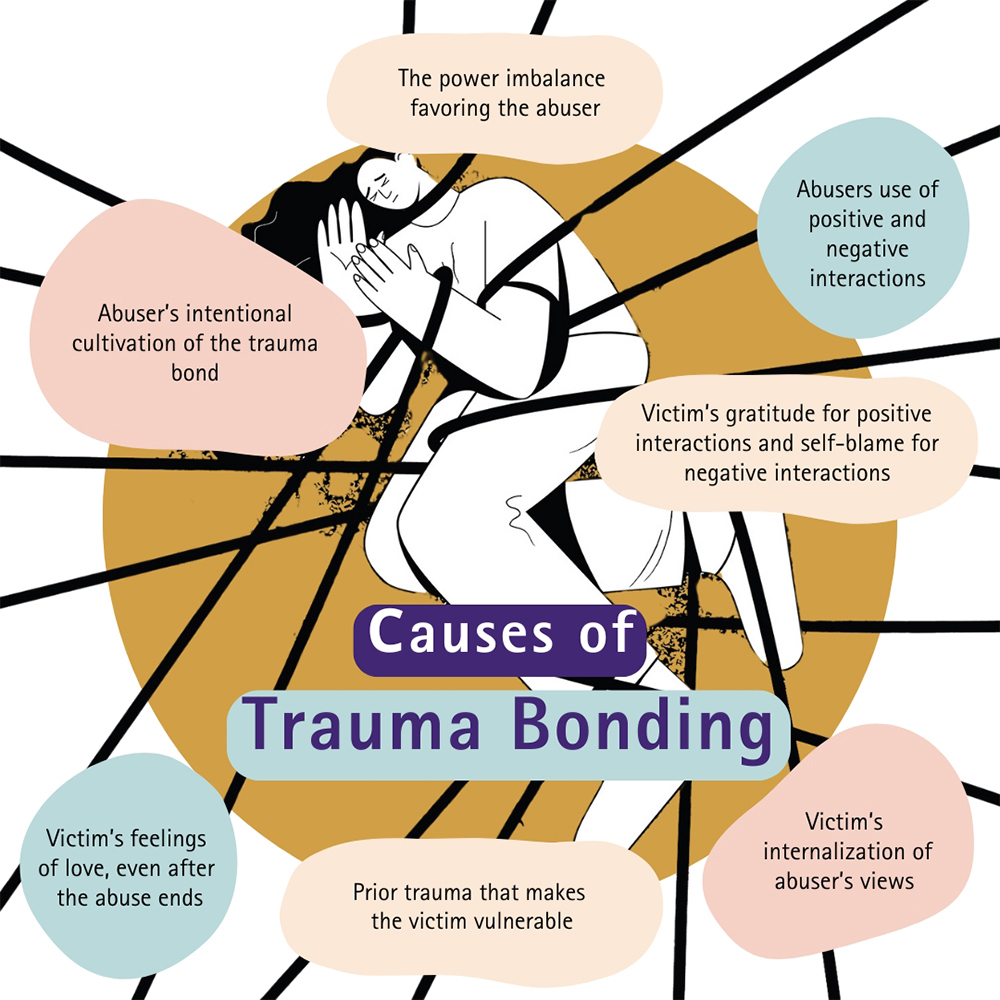What Is Trauma Bonding?

A trauma bond is an emotional attachment between an abuser and a victim after repeated violence. Some people confuse a trauma bond to be an attachment between people who went through a traumatic experience together, such as bonding over trauma.
A trauma bond usually occurs because of:
- The power imbalance favoring the abuser
- Abusers use of positive and negative interactions
- Victims gratitude for positive interactions and self-blame for negative interactions
- Victim’s internalization of abuser’s views
- Prior trauma makes the victim vulnerable
- Victim’s feelings of love, even after the physical or verbal abuse ends
- Abusers’ intentional cultivation of the trauma bond
A trauma bond is not your fault.
However, a trauma bond therapist can help you identify strategies to help you overcome the effects of an abusive relationship.
Empathy plays a large role in creating a trauma bond. There have been 2 types of empathy identified:
- Affective empathy: This type involves understanding the emotions of others.
- Cognitive empathy: This involves understanding someone’s perspective
The combination of both these types of empathy helps to create a trauma bond. One theory states that a trauma bond is an unresolved form of insecure attachment.

Trauma Bonding With a Narcissist
This typically happens because the narcissistic abuser uses a combination of positive and negative experiences. The narcissist may use manipulation tactics such as gaslighting, love-bombing, and devaluation. At times, substance use (substance abuse) and eating disorders may be common in abusive relationships, which creates a complex situation.
The victim ends up viewing the positive experiences as valuable and begins relying on the abuser. The victim may have difficulty leaving the relationship with the narcissist due to fear, emotional attachment, and a distorted perception of the narcissist.
Signs of Trauma Bonding
Some signs that may indicate the presence of trauma bonding include:
- Mixed emotions: If you experience highs and lows in your relationship, this is typically a sign that you are in an abusive relationship.
- Rationalizing: You may find yourself making excuses for the abuser’s behavior or minimizing it.
- Isolation: You feel you cannot spend time with people you were once close to, such as friends or family.
- Difficulty leaving: You try to leave, but something keeps making you come back to toxic relationships.
- Low self-esteem: You may find it difficult to accept and love yourself.
Not all of these signs are necessary for a relationship to be a trauma bond. If you are experiencing any of the above, talk to one of our mental health counselors today.
Break Free from Trauma Bonding
Stopping the cycle of abuse can be difficult. In our experience, having support is always beneficial.
Here are some things you can do to break free from trauma bonding:
- Educate yourself: Learning about the manipulative tactics abusers use and becoming aware of them in your life is the first step.
- Set boundaries: Boundaries allow others to know how you want to be treated. One of the most important aspects of setting boundaries is enforcing them.
- Focus on self-care: Learning to love and care for yourself is one of the most important things you can do to prevent future physical, emotional, and sexual abuse.
- Seek support: Building a support system of people who have your best interests at heart. This can be your family, friends, your therapist, and a support group in West Palm Beach.
- Create a safety plan: If you are currently in an abusive situation, your therapist can help you create a plan for if you’re in immediate danger.
Each situation is unique and requires a unique solution. Your therapist can help guide you in deciding on a solution that works best for you.
How Trauma Bonding Therapy Can Help You Heal
Therapy can help you heal the negative effects and post-traumatic stress disorder (PTSD) symptoms of an abusive relationship.
Through therapy, you can:
- Learn to love yourself and treat yourself with kindness
- Build healthy relationships
- Develop healthy habits
- Practice assertiveness
You and your West Palm Beach therapist will work on finding the right solutions for you.
Online Therapy or Virtual Consultations
Therapeutic Approaches
There are several ways to heal. Some interventions we utilize based on research include:
- Trauma-focused cognitive behavioral therapy (TF-CBT): This intervention aims to identify the negative beliefs that were formed as a result of traumatic experiences. Your therapist will help you reframe those beliefs and cultivate self-compassion.
- Rational emotive behavioral therapy (REBT): REBT helps clients identify their expectations and “shoulds”, also known as irrational beliefs, and disprove them.
- Eye movement desensitization and reprocessing (EMDR): EMDR helps individuals remove the strong negative emotions associated with traumatic memories.
- Somatic therapy: Utilize the mind-body connection to release trauma stored in the body.
All our WPB therapists specialize in trauma-focused therapy, which can be particularly helpful for healing from trauma bonding.
Our dedicated trauma therapists in West Palm Beach, equipped with trauma counseling expertise, are here to help you navigate the complexities of relationship trauma. Take the first step to increasing your self-worth, improving self-confidence, and cultivating self-love. Our private practice has locations across Palm Beach County. Call us today to learn more about how we can help you get back to yourself and find inner peace.

